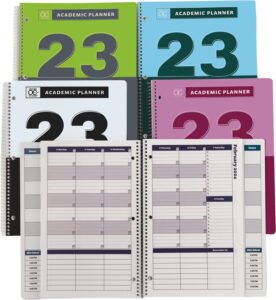Student Time Management and Organization
It’s that time of year again! School is in session. How is your student managing their time? Do you find yourself constantly nagging them to do their homework? Do they always end up doing a large project the night before it’s due? Managing their time and organizing the tasks they need to do is a common issue for today’s students.
So how can you help them?
First, ask yourself some questions. Do they have a good system in place to track all of their to-dos? Are they proactively planning and working ahead? Do they have a way to look at their extracurricular commitments AND their schoolwork in order to see possible future time crunches? Have you discussed the benefit of working ahead and not doing everything at the last moment? Is their desk space organized and uncluttered, with appropriate supplies and limited distractions? Do they have both a paper filing and electronic filing system (they should be similar) in place so they can easily find the information they need to do their work?
One of the most important things a parent can do to prepare a child for schooling at the next level (e.g., middle school, high school, college), is to make sure they have good time management and organization skills to manage their workload. Each year, the amount of work a student is expected to manage increases. The system they used previously needs to be continually improved to meet their additional workload.
Time Management - Most students are using some system. However, many of them haven’t customized it to work well for THEM or are missing some important pieces. Share on XIs your student learning time management?
I’m amazed that our schools don’t actively teach our students to do this as part of their education. If you’re lucky, they’ve had a teacher that made this a personal priority. I’ve seen so many capable students whose work suffered not because of their ability, but because of limited organizational and time management skills.
So, if you haven’t already, sit down with your student and have them show you the system they use. Ask the questions listed above. Ask what is working and what is not working. Try not to be judgmental. Don’t try and impose your system on them. We all operate a bit differently and each individual needs his or her own system. Many students do well with a planner that includes both school and extracurricular activities managed together in a very visual, grid type format (the planners handed out by many schools DON’T work well for some students or would work better used in a modified way). Others can operate fine with a series of lists. Some like to use paper and pencil and others prefer to use an automated tool or application.
Ask them how they are filing their schoolwork, both paper, and electronic files.
Encourage them to set up a paper-based filing system in a file drawer or file crate for this year’s schoolwork. (If they haven’t cleared out last year’s work, now is a good time to get that done!). Most students file papers and files by school subject, making subfolders as needed. Others prefer to file based on their block scheduling (odd day subjects vs. even day subjects). The system should make sense to them and paper and electronic filing systems should be the same.
Finally, make sure they have a good place to work.
It should be comfortable and inviting. Ideally, they should have a hard surface, a comfortable reading chair, access to organized supplies, easy access to a computer and their electronic filing system, a file cabinet or crate for paper files (with extra folders and hanging files), and limited distractions. Some students need to be encouraged to leave their mobile devices in another room while working. Others work better with background music. Encourage your student to try a few different things. Many of them are surprised how productive they are when their phones AREN’T in the room with them.
Most students are using some system. However, many of them haven’t customized it to work well for THEM or are missing some of the important pieces discussed above.
 Academic Planners and Accessories
Academic Planners and Accessories
Order Out of Chaos, provides time-management products designed with your student in mind. Working with students and their parents to develop organizing and time management skills that don’t come naturally to everyone but can be taught. Giving students an easy way to see time so they can learn to manage it.
Their award-winning Academic Planner: A Tool For Time Management® patented calendar layout allows students to see school assignments ALONGSIDE after-school activities so they can plan WHEN they have time to get work done. Our proven student planner’s design helps students feel in control, manage their workload, and plan their homework time.
Subscribe by email
Enter your email address to subscribe to this blog and receive notifications of new posts by email.
Janet Schiesl

Janet has been organizing since 2005. She is a Certified Professional Organizer and the owner of Basic Organization.
She loves using her background as a space planner to challenge her clients to look at their space differently. She leads the team in large projects and works one-on-one with clients to help the process move quickly and comfortably. Call her crazy, but she loves to work with paper, to purge what is not needed and to create filing systems that work for each individual client.
Janet is a Past Board Member of the National Association of Productivity and Organizing Professionals and a Past President of the Washington DC Chapter of NAPO were she has been named Organizer of the Year and Volunteer of the Year.

Janet Schiesl
Janet has been organizing since 2005. She is a Certified Professional Organizer and the owner of Basic Organization.
She loves using her background as a space planner to challenge her clients to look at their space differently. She leads the team in large projects and works one-on-one with clients to help the process move quickly and comfortably. Call her crazy, but she loves to work with paper, to purge what is not needed and to create filing systems that work for each individual client.
Janet is a Past Board Member of the National Association of Productivity and Organizing Professionals and a Past President of the Washington DC Chapter of NAPO were she has been named Organizer of the Year and Volunteer of the Year.

 Academic Planners and Accessories
Academic Planners and Accessories
There are various time management tools available these days but the most easy and hassle free cloud based application has been Replicon time management software – http://www.replicon.com/olp/time-management-software.aspx which is very simple cloud based time tracking application. It can be quickly implemented and has got so many great features with nice utility as well.
Thanks for the recommendation. I’ll check it out.
I love your point about how everyone works a little bit differently. My two kids are polar opposites in how they manage their time, and I only wish I felt I could take the credit for the one who does it so well! Her brain just likes things organized and done, in a way that’s different than me and my son. Thanks for sharing these tips!
That’s what makes it so hard to teach. It’s really an individual learning skill.
I too am amazed at how little instruction there is in the schools for managing time. Helping your children plan and manage time crunches and conflicts is a wonderful gift a parent can provide. I love that you pointed out not to force a child to use any specific system. There are lots of options, and what matters is finding one that the child is comfortable with. I have one daughter who uses a paper planner, another a bullet journal, and a husband who is all digital.
I suspect that because managing time is so individual that is why they don’t teach it in school. But I think it would be great and add some critical thinking into the process if each child could work towards figuring out what will work for them.
Great tips, Janet! One of the questions I would ask my children before school starts are, “where do you plan to keep your papers?” It allows them to think about it before I overbuy school supplies. I find that my kids need binders not so much for organizing their school papers but for keeping their textbooks contained. The physical textbooks are loose-leaf sheets of paper, and they can easily get out of order.
My son uses Order Out of Chaos’ planner. He says it helps him stay on top of the projects and assignments. He has been using it since high school. I wish I had a planner like that when I was in school. =)
The academic planner is great. I also wish I had one (and/or my kids had them). I used to set up a homework area with my kids before the school year started. 1. so they could have a say in it. 2. so they’d get excited about doing homework.
Having good time management skills can make all the difference in academic success. Can you imagine if they taught these skills as a regular part of the school from early education to high school, even college? You’re right that if a kid is lucky to have a teacher that has made it their priority to teach these skills, it can be incredible. However, most often becomes the job of parents or tutors to teach. And that’s OK too. Honoring the different learning styles and ways to envision time is essential. It is vital to recognize that students have varying environmental preferences for doing their homework- music, no music, or bedroom vs. kitchen. As a parent, creating a conducive work/study environment with a low entry barrier is vital. If your student has to hunt down school supplies and prepare a clear surface to work, it can demotivate them before they even start working. I love Leslie’s planner, along with all of her advice to parents and students.
I love Leslie’s planner too. Imagine if a school system adopted a standard time management education that would be taught and reinforced throughout the years. As I mentioned to Sheri, I think teachers would be the first to educate.
I often suggest to clients that they don’t go out and buy a new desk for their child’s bedroom right off the bat. Put up a card table is some kind of makeshift desk to see if they use it, for exactly the reason you said, they may be kitchen table homework kids.
In my experience, kids think they’ve got this, and they seldom do. I agree this is such an important skill to help kids and young adults master for success. It will pay dividends throughout their lives.
I agree Sheri. I wish my school system (and all school systems) taught time management. But I think the first step would be to teach it to the teachers. I’ve experienced some teachers that need more education.
Such a great point about the planners schools hand out – my kids were always given small planners with tiny spaces to write in. They never used them because there was no way to fit the information they needed into the small spaces allocated. They both did better with a full-size planner with plenty of room for them to customize as they went along through the school year.
I love a good planner and it’s so important for kids when they are learning how to manage their time. I could never get my kids to use a planner and the one the school provided was useless.
You make excellent points, especially about finding the right systems for the right person. It’s funny, but I know I was never taught paper management in school or by my parents. (My father was chronically disorganized; my mother is incredibly organized with regard to everything but paper because nobody taught her how to manage it in school and she never worked in an office or paper-related environment.) It was just obvious to me.
With time management, however, I think benefitted from seeing two extremes: my mother was always on time (and taught me how to count backward from when something was due or I had to arrive, accounting for every step in the process and how long it would take) and my father was always late arriving or accomplishing things. In elementary school in the 1970s, we learned a lot of life skills for finance (budgeting, maintaining checkbooks, calculating interest) but nothing for time management. However, in middle and high school, they focused on project management — breaking down projects into sub-tasks, assigning arbitrary but helpful benchmark due dates. This was decades before kids were given planners. It’s amazing how much has improved (like with Leslie Josel’s planner), but unfortunate how little has changed in other ways.
Sounds like you had great training from your mom and some in school. More than most people. I think schools are now teaching some life management skills, which is good, but I do wonder how the disruption of the pandemic has affected learning these life skills.
When I was in university, I’d buy small red notebooks specifically to keep track of my assignments, and that worked well for me. I suspect it wouldn’t be enough in today’s high tech, fast-paced world, but it might still be helpful for someone who prefers non-digital tools and doesn’t need a complete planning system.
Yes. I think writing things down helps solidify it in your brain, but that’s hard to tell today’s students. They want to be all digital.